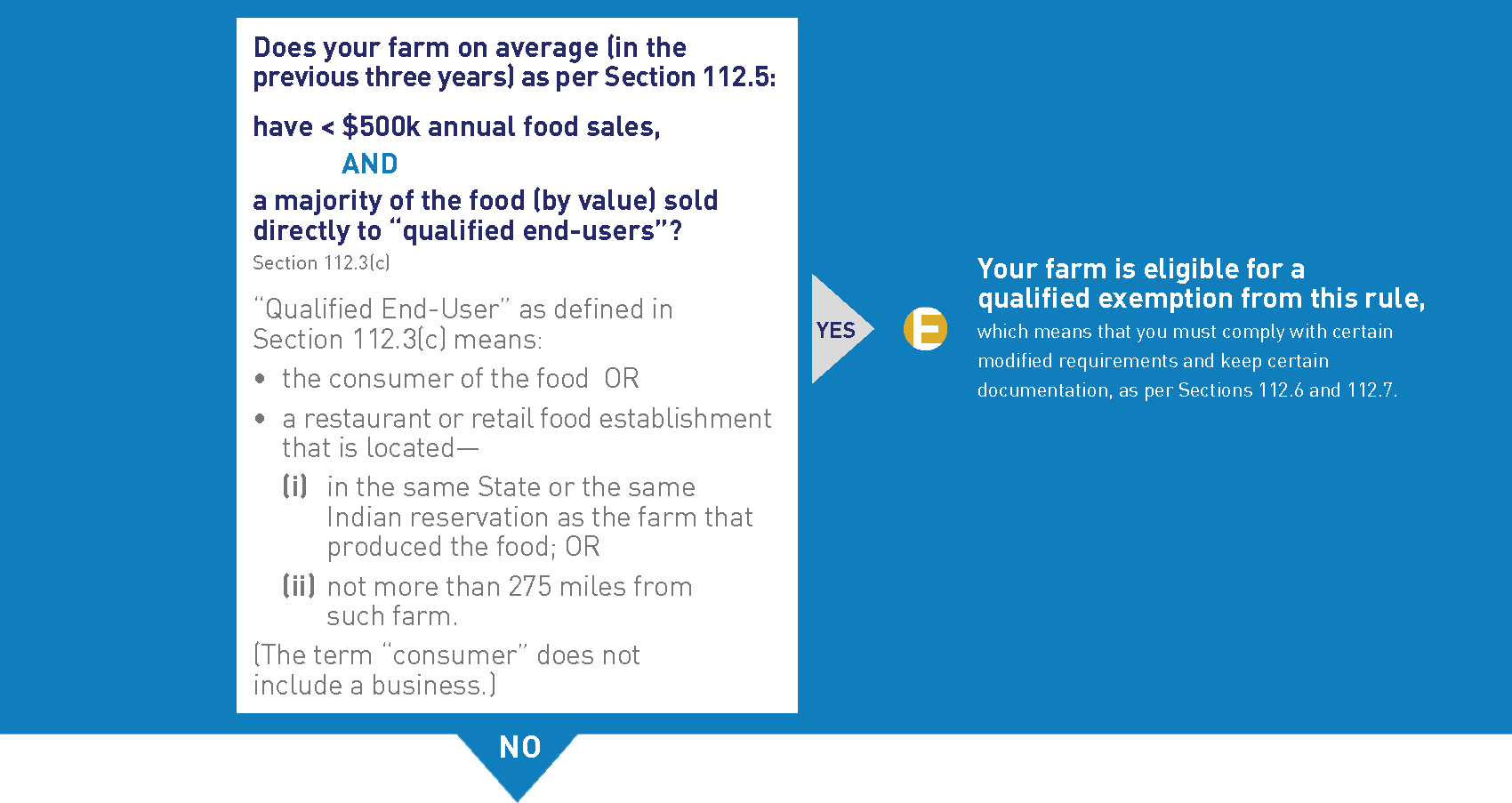The Food Safety Modernization Act Produce Safety Rule
What is the FSMA PSR rule?
To minimize the risk of serious adverse health consequences or death from consumption of contaminated produce, the Food and Drug Administration (FDA) has established science-based minimum standards for the safe growing, harvesting, packing, and holding of produce raw agricultural commodities grown for human consumption. FDA established these standards in the Standards for the Growing, Harvesting, Packing, and Holding of Produce for Human Consumption, referred to as the Produce Safety Rule under 21 CFR Part 112, as part of the implementation of the FDA Food Safety Modernization Act (FSMA).
The goal of the FDA Food Safety Modernization Act Produce Safety Rule (FSMA PSR) is not to just contain food-borne outbreaks, but prevent them from occurring in the first place. FSMA PSR went into effect January 26, 2016.

With the Nebraska Produce Safety Program, you can build more trust with every potential buyer that comes your way. To register, fill out our Produce Farm Survey, complete optional trainings, reviews, or inspections to help us reduce the risk of food contamination. By registering, the NDA will be able to assist you with understanding the new Produce Safety Rule. Contact us to learn more about when the rule will affect your farm.
Nebraska Farmers Market Online Database
It's free to register in our Nebraska Farmers Market Online Database. Creating an online profile helps market your produce and facilitates our communities' engagement. Be sure to regularly log in to your online profile to make sure all your information stays up to date.
Not a grower, but looking for local produce?
The Nebraska Farmers Market Online Database provides a list of farmers markets as well as local produce growers selling fresh, local produce close to you!
FSMA Produce Safety Alliance Grower training is being offered online on various dates. For more information, click here.
*Participants will only be eligible for the PSA/AFDO Certificate of Course Completion if they are present for all modules of the course.*
This class will be on March 7th and will be held virtually from 10am - 12pm.
Edible Mushroom Foraging Training Sign Up Form
To determine where your farm falls under the Produce Safety Rule, use FDA's decision tree, a step-by-step guide on coverages/exemptions to the PSR.
Follow FDA's decision tree to determine where your farm falls under the Produce Safety Rule.

Produce means any fruit or vegetable (including mixes of intact fruits and vegetables) and includes mushrooms, sprouts (irrespective of seed source), peanuts, tree nuts, and herbs. A fruit is the edible reproductive body of a seed plant or tree nut (such as apple, orange, and almond) such that fruit means the harvestable or harvested part of a plant developed from a flower. A vegetable is the edible part of an herbaceous plant (such as cabbage or potato) or fleshy fruiting body of a fungus (such as white button or shiitake) grown for an edible part such that vegetable means the harvestable or harvested part of any plant or fungus whose fruit, fleshy fruiting bodies, seeds, roots, tubers, bulbs, stems, leaves, or flower parts are used as food and includes mushrooms, sprouts, and herbs (such as basil or cilantro).

Produce does not include food grains meaning the small, hard fruits or seeds of arable crops, or the crops bearing these fruits or seeds, that are primarily grown and processed for use as meal, flour, baked goods, cereals and oils rather than for direct consumption as small, hard fruits or seeds (including cereal grains, pseudo cereals, oilseeds, and other plants used in the same fashion). Examples of food grains include barley, dent – or flint-corn, sorghum, oats, rice, rye, wheat, amaranth, quinoa, buckwheat, and oilseeds (e.g., cotton seed, flax seed, rapeseed, soybean, and sunflower seed).
If you do not sell the listed amount of produce, your farm is not covered by the PSR.

Are you and your family the only ones who eat your produce? If so, you are not covered by this rule.

The PSR provides an exemption for produce that receives commercial processing that adequately reduces the presence of microorganisms of public health significance, under certain conditions. (i.e. fermenting, canning, cooking, etc.)
For example, if you are a grower who only sells strawberries to a processor to be made into jelly, you would be exempt from this rule. However, you would need to provide documentation from the processor that explains to the grower how your strawberries will be processed in a way that adequately reduces the presence of microorganisms.

Download: Produce Safety Rule Decision Tree
- Coverages and Exemptions/Exclusions (PDF, color)
- Coverages and Exemptions/Exclusions (PDF, black/white)

The PSR has specific record keeping requirements for produce growers.
Updates from FDA
The FDA has updated Subpart E – Agricultural Water, of the FDA Food Safety Modernization Act (FSMA) Produce Safety Rule (PSR) to strengthen produce safety.
In July 2024, the FDA finalized a systems-based approach for Pre-Harvest Agricultural Water. Growers are now required to annually assess water systems, identify potential hazards, and implement corrective actions. This replaces previous microbial quality criteria and testing requirements. Compliance deadlines are April 2025 for large farms, April 2026 for small farms, and April 2027 for very small farms.
For Harvest and Post-Harvest Agricultural Water, updated requirements mandate that water must contain no detectable generic E. coli per 100 mL, prohibiting untreated surface water unless treated. Testing, mitigation, and recordkeeping are required, with compliance deadlines of January 2023, 2024, and 2025 for large, small, and very small farms, respectively.
Pre-harvest Agricultural Water Resources
FSMA Final Rule on Pre-Harvest Agricultural Water
An agricultural water assessment is an annual evaluation of the water systems used in farming operations to identify potential hazards that could affect the safety of produce. This assessment is a critical component of the systems-based approach introduced in the updated FSMA PSR.
The goal of the assessment is to:
- Identify potential hazards: These could include microbial contamination or other factors that may affect the safety of water used during pre-harvest, harvest, and post-harvest activities.
- Evaluate water quality and usage: Assess how water is sourced, stored, and applied in agricultural practices, and whether it meets the necessary safety standards.
- Determine corrective actions: Based on the assessment findings, the grower may need to implement corrective or mitigation measures to reduce risks and ensure water used in agricultural activities is safe for produce.
Pre-Harvest Compliance Deadlines:
- April 7, 2025, for large operations
- April 6, 2026, for small operations
- April 5, 2027, for very small operations
Pre-Harvest Agricultural Water Assessment (Ag.W.A.) Resources
- Annual Ag.W.A. Flowchart
- FSMA Final Rule on Pre-harvest Ag Water Fact Sheet (English)
- FSMA Final Rule on Pre-harvest Ag Water Fact Sheet (Español)
- FDA Ag.W.A. Builder
- Paper-Based Ag.W.A. Builder Tool
- Paper-Based Ag.W.A. Builder Tool (Español)
- Factors for Ag.W.A. to Consider
- Factors for Ag.W.A to Consider (Español)
- Corrective & Mitigation Measures for Pre-harvest Agricultural Water for Non-Sprout Covered Produce
- Corrective & Mitigation Measures for Pre-harvest Agricultural Water for Non-Sprout Covered Produce (Español)
Harvest & Post-Harvest Agricultural Water Resources:
Requirements for Harvest and Post-Harvest Agricultural Water in Subpart E for Covered Produce Other than Sprouts
The FDA has updated its requirements for harvest and post-harvest agricultural water under Subpart E of the FSMA PSR to enhance produce safety and reduce foodborne illness risks. These changes include:
- Microbial Standards: Farms must ensure that agricultural water used in harvest and post-harvest activities contains no detectable generic E.coli per 100 mL. Untreated surface water is prohibited for these purposes unless properly treated to meet safety standards.
- Testing Requirements:
- Water from public systems or treated sources is exempt from testing, provided documentation is available.
- Untreated groundwater must be tested, starting with four samples in the first year and one sample annually thereafter, to verify compliance.
- Corrective Measures: If water quality does not meet the required standard, farms much discontinue its use and take measures like system inspections or water treatment before resuming.
- Recordkeeping: Farms are required to maintain detailed records of water assessments, testing, and corrective actions.
- January 26, 2023, for large operations
- January 26, 2024, for small operations
- January 26, 2025, for very small operations
Produce Safety Rule
- FDA Announces Enforcement Discretion Policy for Certain Produce Commodities
- FDA’s inflation table for $25,000 and $500,000
- FSMA final law in formal language
- Produce (rarely eaten raw) excluded from the rule, according to FDA
- Produce Safety Rule Legal Rule Federal Register
On-Farm Readiness Reviews
- What to Expect During an On-Farm Readiness Review
- Video: On-Farm Readiness Reviews with Caitlyn Andrews
Inspections
Flooding
- FDA Guidance: Evaluating the Safety of Flood-affected Food Crops for Human Consumption
- Frequently Asked Questions about Handling Flooded Produce
- Guidance and Assistance After Flooding
Qualified End User Information
To be qualified exempt, the Decision Tree asks if your farm has less than $500,000 in FOOD sales and a majority of the food is sold directly to a qualified end user.
- “Food” here includes, but is not limited to, fruits, vegetables, fish, dairy products, eggs, raw agricultural commodities for use as food or components of food, animal feed, including pet food, food and feed ingredients and additives, including substances that migrate into food from food packaging and other articles that contact food, dietary supplements and dietary ingredients, infant formula, beverages, including alcoholic beverages and bottled water, live food animals, bakery goods, snack foods, candy, and canned foods.
- So when it asks about food sales in this situation, it would include your food grains and produce as well as any other food you sell (not just produce).
- Qualified end user is
- The consumer of the food OR
- A restaurant or retail food establishment that is located in the same state or the same Indian reservation as the farm that produced the food OR
- Not more than 275 miles from such farm (“consumer” does not include a business).
- Selling products at a farmers market in the same state or within 275 miles of your farm would be considered selling to a qualified end user.
- A majority of sales means more than 50%.
Farms with a qualified exemption must still meet certain requirements:
Labeling: Disclosing the name and address of the farm where the produce was grown either on the label of the produce or at the point of purchase.
Records: Keep adequate records showing that the farm is below the sales threshold, selling more to qualified end users than not, and purchaser is a qualified end user.
Qualified Exemption: A farm is eligible for a qualified exemption if the average annual monetary value of all food sold during the 3-year period preceding the applicable calendar year was less than $500,000, adjusted for inflation, and sales to qualified end-users during such period exceeded the average annual monetary value of the food sold by such farm to all other buyers.
NOTE: In May 2020, FDA issued guidance announcing flexibility in the eligibility criteria for the qualified exemption from the Standards for the Growing, Harvesting, Packing, and Holding of Produce for Human Consumption Regulation due to disruptions to the supply chain during the COVID-19 public health emergency. This temporary policy remained in effect until Nov. 7, 2023. In April 2023, FDA issued guidance to help explain how farms may transition from the temporary policy back to the usual qualified exempt criteria in the Produce Safety Rule.
| Baseline Value for Cut-offs (2011) | Value in 2019 | Value in 2020 | Value in 2021 | Value in 2022 | Value in 2023 | Average 3 year Value for 2021 - 2023 |
|---|---|---|---|---|---|---|
| $500,000 | $568,468 | $575,972 | $602,382 | $644,795 | $668,297 | $638,491 |
Not covered farm: A farm or farm mixed-type facility with an average annual monetary value of produce sold during the previous 3-year period of less than $25,000 (on a rolling basis).
| Baseline Value for Cut-offs (2011) | Value in 2019 | Value in 2020 | Value in 2021 | Value in 2022 | Value in 2023 | Average 3 year Value for 2021 - 2023 |
|---|---|---|---|---|---|---|
| $25,000 | $28,423 | $28,799 | $30,119 | $32,240 | $33,415 | $31,925 |
Key Differences:
- Growth Method
- Sprouts: Grown in water or a moist environment without soil or light. Seeds germinate and are harvested quickly, typically within 2-7 days.
- Microgreens: Grown in soil or another growth medium under sunlight or artificial light. They are harvested at the first true leaf stage, usually after 7-21 days.
- Edible Parts
- Sprouts: Entire seed, root, and shoot are consumed.
- Microgreens: Only the stems and leaves are consumed; roots and growth medium are not eaten.
- Conditions
- Sprouts: Require warm, humid environments, ideal for rapid bacterial growth.
- Microgreens: Grown in relatively cooler, drier conditions under light, which are less conductive to bacterial proliferation.
Why Sprouts are Riskier:
- Ideal Conditions for Pathogens
Warm, humid environments required for sprout production also favor the growth of harmful pathogens like Salmonella and E. coli. Contaminated seeds or water can quickly lead to outbreaks. - No Kill Step:
Sprouts are often consumed raw without any cooking step to kill pathogens, increasing the risk of foodborne illness. - Seed Contamination:
- Contaminated seeds are a common source of outbreaks. Even trace contamination can multiply under sprouting conditions.
- The sprouting process amplifies any existing pathogens because nutrients in the seed nourish bacterial growth.
Why Microgreens are Safer:
- Growth Medium
Growing microgreens in soil or another substrate keeps them somewhat separated from potential waterborne pathogens. - Environmental Conditions
The lower humidity and light exposure reduce the likelihood of pathogens thriving. - Harvest Practices
Cutting above the soil level minimizes contamination from roots or growing medium, which is not consumed.
FDA's Specific Caution for Sprouts:
The FDA focuses on sprouts due to their documented history of causing foodborne illness outbreaks. Despite extensive guidance, sprout production remains high-risk because:
- Preventing contamination at the seed level is challenging.
- The warm, humid environment for sprouting is difficult to control without meticulous sanitation and water testing.
Microgreens, while NOT entirely risk-free, do not share the same inherent risks due to their distinct growing conditions and consumption practices.

Tory Heisner, Produce Safety Program Specialist
Hi, I’m Tory Heisner, the Produce Safety Program Specialist for the Nebraska Department of Agriculture. I hold a B.A. in Biology from the University of Nebraska at Omaha and am dedicated to supporting Nebraska’s agricultural community while ensuring public safety. I work with produce growers to help them comply with the Produce Safety Rule (PSR) and related regulations.
With a nurse for a mom and a farmer for a dad, my passion for the intersection of health and agriculture drives my commitment to this role. Outside of work, I enjoy fitness, hunting, fishing, learning ASL, and exploring nutrition and sustainable living.
I focus on inspections, offering guidance, and promoting produce safety, aiming to bridge the gap between regulatory compliance and farming operations.
Jennifer Loeffler, Inspector
Hello! I was born and raised in Norfolk, NE. After earning a B.A. in Biology at the University of NE in Omaha, I later returned to my hometown and began my career in public health.
I have been an inspector with NDA since 2015. Mostly my days are spent visiting retail establishments (restaurants, grocery and convenience stores, food trucks and bars), as well as warehouses and processing facilities.

My interests and hobbies include yoga, gardening, practicing other languages, and learning about philosophy, nutrition, and holistic medicine.
I love meeting people and getting to know all kinds of local businesses. Every day is a new adventure! I am fortunate to have the opportunity to learn from Nebraska growers, too -- and to support them in their important role of providing excellent food.
If you have questions, you can contact us by email, agr.produce.safety@nebraska.gov, or by phone, 402-471-3422.
We can help you complete the inventory questionnaire. We can also help you with the decision tree to determine if you will be covered by the rule or exempt from the rule.
How is the Produce Safety Rule implemented in the state of Nebraska?
The FDA and the State of Nebraska have a cooperative agreement to meet objectives. The state of Nebraska will conduct produce safety inspections under the FDA’s authority and will complete other applicable program objectives. For additional information please visit: FDA-State Produce Safety Implementation Cooperative Agreement Program.
What is FSMA PSR's goal?
The goal of FSMA PSR is to prevent and minimize the risk of serious adverse health consequences or death from consumption of contaminated produce.
How does the state of Nebraska apply the FSMA PSR?
The state of Nebraska applies FSMA PSR through the following steps:
- Educate - The state of Nebraska is committed to educating produce growers on how to comply with the FSMA Produce Safety Rule. Participation in Produce Safety Alliance Trainings, On Farm Readiness Reviews, and Farm Technical Assistance are a great way we can help set you up for success.
- Implement - Ensure that proper practices are in place and records are being maintained. To ensure successful implementation of the program, staff should be adequately trained to understand regulatory requirements, preventative controls, and food safety practices.
- Regulate - FSMA PSR is mandatory. Compliance to the program will be ensured through regulatory inspections.
How does the Produce Safety Rule fit in with the State of Nebraska's priorities?
- The PSR promotes consumer safety, through ensuring risks associated with consumption of contaminated produce are minimized.
- The PSR promotes customer service through offering education, and communication with produce growers and consumers.
- The PSR promotes efficiency and effectiveness by maintaining a cooperative agreement with the FDA to meet objectives.
- The PSR promotes growth supporting produce growers who are developing economic opportunities in the state.